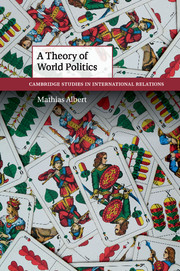Book contents
- A Theory of World Politics
- Cambridge Studies in International Relations: 141
- A Theory of World Politics
- Copyright page
- Dedication
- Contents
- Figures
- Book part
- Introduction
- Part I World society theory
- Part II Emerging world politics
- Part III Reflections and roads ahead
- Concluding remarks
- References
- Index
- Cambridge Studies in International Relations
- References
References
Published online by Cambridge University Press: 05 June 2016
- A Theory of World Politics
- Cambridge Studies in International Relations: 141
- A Theory of World Politics
- Copyright page
- Dedication
- Contents
- Figures
- Book part
- Introduction
- Part I World society theory
- Part II Emerging world politics
- Part III Reflections and roads ahead
- Concluding remarks
- References
- Index
- Cambridge Studies in International Relations
- References
- Type
- Chapter
- Information
- A Theory of World Politics , pp. 221 - 249Publisher: Cambridge University PressPrint publication year: 2016



